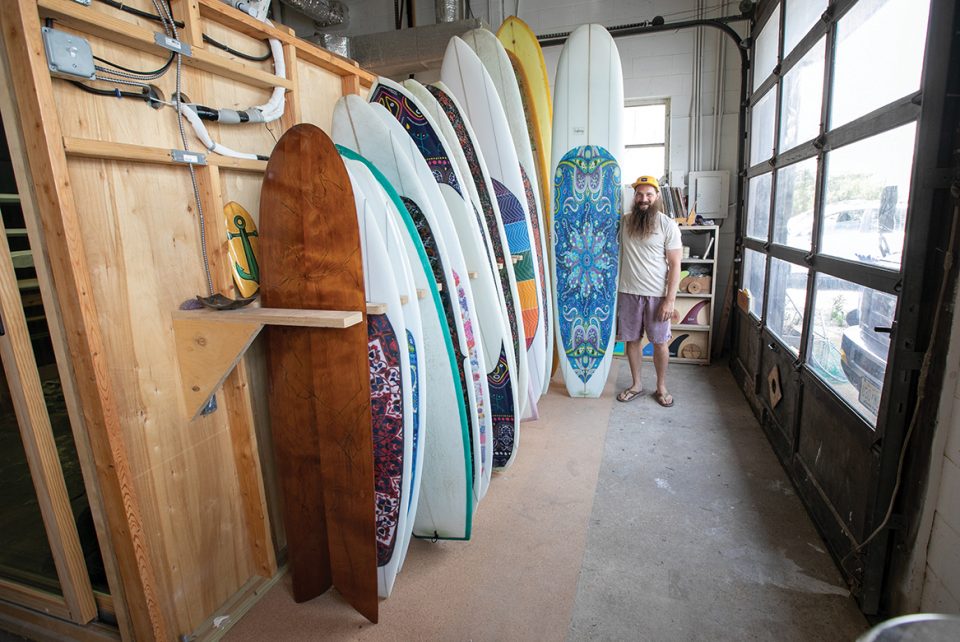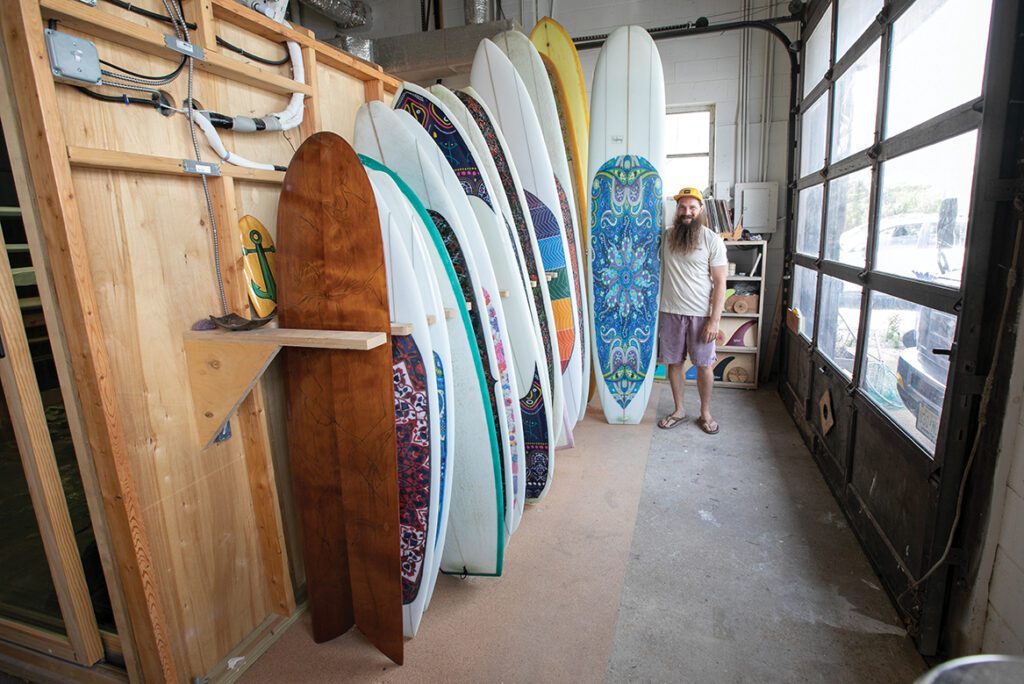
COASTAL EXPRESSIONS: Le Garage surfboard factory and creative space opens at 330 Coral St., Beach Haven, this week. Owner Greg Melega shows off his creations. (Photo by Jack Reynolds)
This week, Le Garage is set to open in Beach Haven – a surfboard factory that makes both fiberglass and wood surfboards as well as surfboard fins. But the surfboard inventory here is not like that of any other surf shop on the Island.
If the name sounds familiar, it’s because the facility is named for Le Garage, the all-ages nightclub that existed in Spray Beach from 1967 through 1974, on the block where the Jewish Community Center of LBI is today. The building had been a garage for trucks and machinery that was converted into a night spot by four LBI summer residents under the age of 25.
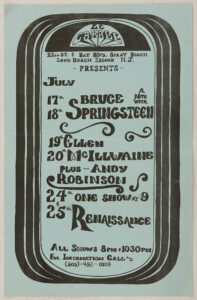
VINTAGE: Promo poster from the original Le Garage, 1974. (Supplied Photo)
With the clever new name, it was a discotheque featuring psychedelic music, elevated dancers and blacklights that morphed into a live music venue. The club did not sell alcohol, so the focus was the entertainment. And with all great Jersey Shore lore, Bruce Springsteen played on July 17 and 18 of 1974. Although it’s long gone, the stories have become part of the rich fabric of LBI youth culture history.
It was the perfect name for this new venture, which takes many of its cues from the ’60s/’70s era. The new Le Garage is at 330 Coral Ave. in Beach Haven, in what was fittingly, until recently, Eastern Engine Service.
“Le Garage is a place where people can come see how a surfboard is made and get a more in-depth view than what you get at a retail store,” said Greg Melega, the driving force behind Le Garage. “This is more of an experience. You don’t have to buy something. When you come here, it’s to understand the craft.”
Melega, 31, a Beach Haven native, is a surfboard shaper under the label Seafaring Surfcrafts, who has no fewer than a dozen projects going on at once and is himself a throwback to that period, when surf shops might make their own boards. It was an era where surfers were experimenting with their surfcraft. Melega has studied that era, taken the best of it and mixed it with the decades since to create his own style. His father worked security at the original Le Garage.
The facility will have surfboards that are free to take out and demo, to see how each rides.
“I’ve always wanted to ride every board in a surf shop, but I don’t have $10,000 to buy everything I like,” he said, laughing. “Here people can ride something and see what works for them.”
Le Garage will have some basic wares for sale – T-shirts and surf wax, much as surf shops did in the 1960s. Melega also has artwork by many of his friends for sale. He will offer a space for traveling surfboard shapers and surfboard fiberglassers to work. It will also serve as the headquarters for Melega’s surfing lessons, a side business he has cultivated over the last 10 years.
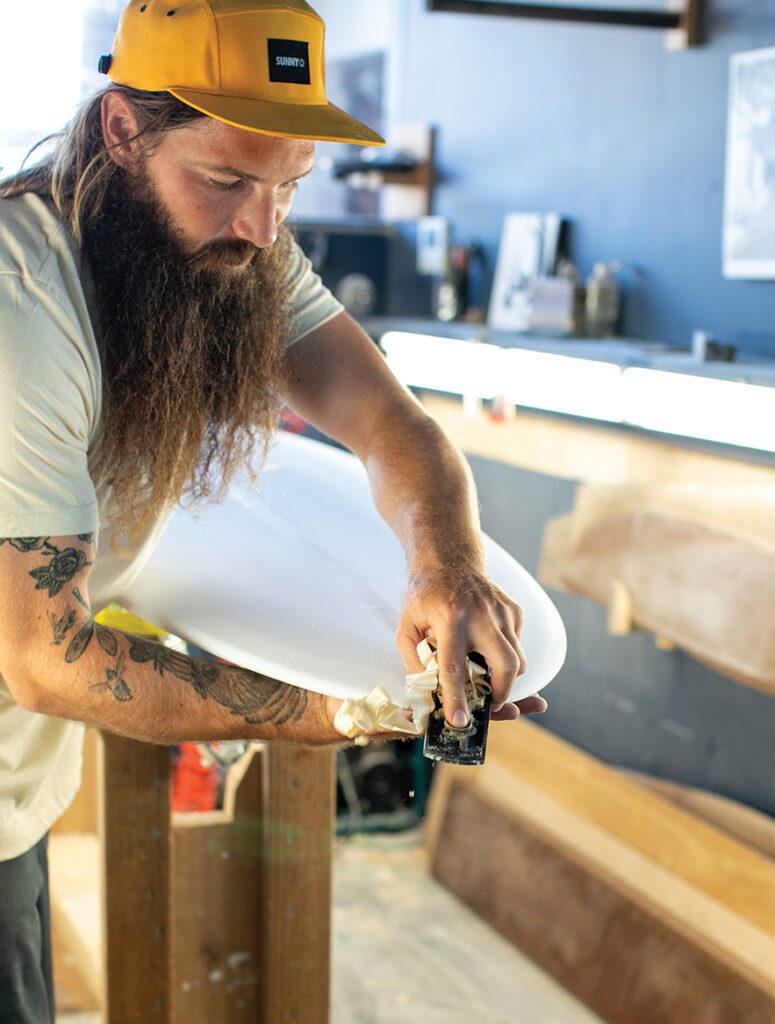
SHIP SHAPE: Seafaring Surfcrafts’ Greg Melega shapes a custom board at Le Garage. (Photo by Jack Reynolds)
Melega’s idea of teaching surfing is different as well. While most local surf schools offer a one-hour lesson where newcomers get pushed into waves, most of Melega’s clients have been with him for three years or more. He teaches them all aspects of surfing and works with them year ’round.
“It’s more of the lifestyle. I point them toward boards to ride – whether that’s a Matador (the Brighton Surf Shop brand started by the late Richard Lisiewski in the ’60s) or my boards, really whatever works for them,” Melega explained, “I give advice on wetsuits and gear. I have them download an app to follow tides and swells and have them watch different videos when they’re not surfing. I’ll ask what music they’re listening to and make plans to go see bands with them after we surf. Sometimes the wind is too hard south, so we’re going sailing. It’s a constant feed to get them dialed.”
It’s an old-school approach to teaching everything about surfing from the mechanics of going down the line to noticing when an osprey pulls a fish from the ocean.
One past client is the owner of the Le Garage building, an engineer, who had grown up coming to his family’s Island house. He learned to surf under Melega and appreciated his constant drive and creativity. When he bought the building several years ago with the home upstairs for his extended family to spend summers, he offered the sprawling first-floor garage space to Melega, who built out the bays for various stages of surfboard construction.
The owner’s extended family lives upstairs during the summer and shares Melega’s vision for repopulating the lot with native trees and growing the vegetable garden.
“He told me that I had given him all my knowledge of surfing, and now he wanted to give me back all of his knowledge on how he runs his businesses.”
Melega grew up in Beach Haven, but during his final year at the University of North Carolina Wilmington, he became so fascinated with handplanes for body surfing that he never finished school.
“I got head over heels into handplanes and then surfboards. But I didn’t want to make foam boards because of the environmental irony. We’re out enjoying nature on these crafts that are kind of disposable, like the modern surfboard,” he said.
That led to wood. Melega has made approximately 1,000 wooden boards. Most are flat, fairly simple Alaias, the common board ridden by ancient Polynesians. But he has also made a “kookbox,” a hollow chamber replica of those made by Tom Blake in the early 20th century and later by the earliest surfers who found how-to articles in Popular Mechanics magazine in the 1940s. That six-month project birthed a 100-pound board, funded by a state grant through the Tuckerton Seaport, that Melega jokingly describes as “a battleship breaking through the water.”
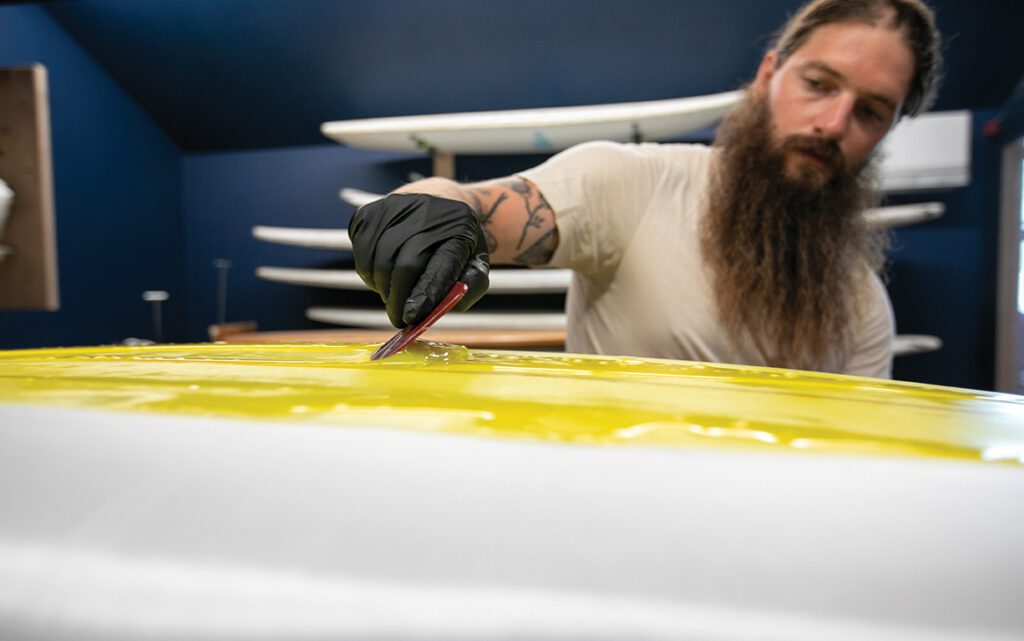
STEWARD OF THE SEA: Greg Melega, owner and maker at Le Garage, uses tinted epoxy fiberglass on a surfboard, as a less toxic alternative to polyester resin. (Photo by Jack Reynolds)
Eventually, he turned to fiberglass boards, which are more functional, and started shaping in a rented workshop at AJ’s Bicycles in Beach Haven.
When Melega makes fiberglass boards now, he elevates the environmental conundrum by using epoxy fiberglass, which is far less toxic. He has made a few hundred and glasses them for durability over lightweight performance.
Unlike other surfboard factories, which use polyester resin, Le Garage does not smell of fumes, and Melega has passed all of Beach Haven’s town inspections. He is working to find less harmful surfboard blanks, contacting suppliers in Europe and even starting conversations with local apparel company Jetty, which uses a textile called Oystex. It’s literally made of ground oyster shells, to create more environmentally friendly fiberglass cloth.
“Ninety-nine percent (of his boards) are made for customers via word of mouth, and probably 70% of those are made for New Jersey surfing,” he added.
Melega is finely attuned to being close to the source of everything he puts his hands on. He spends time at local farms in the summer, picking his own berries. He is constantly making jams and canning local fruit.
Around the factory, visitors will see dozens of projects that get back to a more basic way of life. Melega builds garden boxes and helps run the Beach Haven Community Garden. He makes and sells wooden bowls and “resin pyramids.” He mills the wood of trees that are felled on the Island. While all this is happening, he is also restoring a 50-year-old sailboat (that he currently lives on) and converting an 18-passenger Ford E350 to travel and live in.
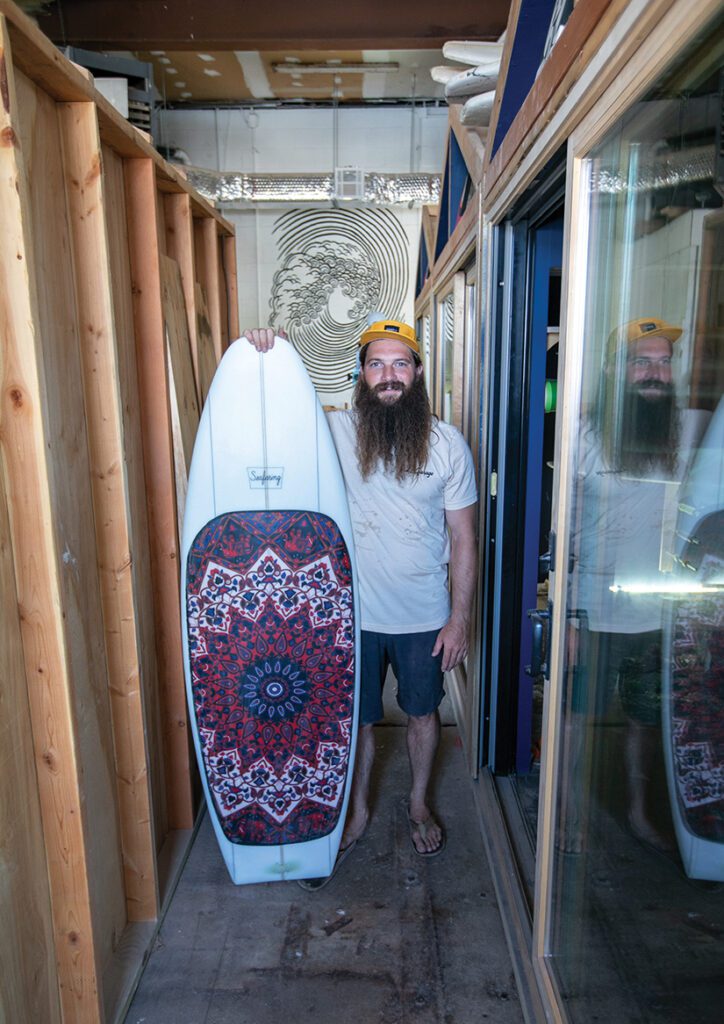
CULTURAL CRAFTS: The surfcraft made at Le Garage look different than the boards in most other surf shops. This shortboard features a fabric inlay from India. (Photo by Jack Reynolds)
“It’s so awesome to have friends who are artists and do projects together – to give someone a board to paint or have someone come in and do a mural on a wall.”
Visits to Le Garage will be by appointment as it’s a working factory. There will be open-house parties once a month as well as classes on building handplanes and wood burning. He envisions hosting full tours in the future where groups are walked through the factory, seeing each stage of surfboard construction. Those interested can follow along at @legaragelbi.
Melega will also be at the Asbury Park music, surf and art festival Sea Hear Now in September, showing off the replica of legendary Hawaiian surfer Duke Kahanamoku’s board he was asked to build.
Melega thrives on things that are made by hand and also teaching what he has learned. His greatest passion is passing on the traditional craftwork that came before him to someone else, so that the art isn’t lost forever in this world of modern mass production. It’s really the basis of everything happening at Le Garage.
When asked if he thinks he was born in the wrong decade, he answered, “No. I think I was born at the right time – to remind everyone else that we don’t need all the crap that distracts us today and feeling like we need material things. And I say that as a manufacturer,” with a laugh. “The things I make are for being in the present.”
— Jon Coen


